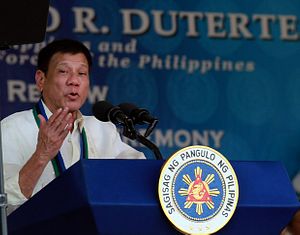Philippine President Rodrigo Duterte has announced that he is canceling the peace talks which his government had initiated with the Communist Party of the Philippines.
This was his response after the communist-led New People’s Army (NPA) said it will end its unilateral ceasefire with the government effective February 10.
The Maoist-inspired NPA has been waging a guerrilla war since 1969. Despite the reported decrease in its members in recent years, it continues to operate in several provinces of the Philippines, most notably in the island of Mindanao.
During his term as mayor of Davao City, Duterte enjoyed good relations with the rebels. That explains why he was able to quickly restart the stalled peace talks between the communists and the government when he became president last year.
Aside from the controversial ‘war on drugs’, peacebuilding is Duterte’s other top priority. He vowed to sign a final peace pact with all armed groups in the country before the end of his term.
Duterte’s decision to release some rebel leaders led to the successful resumption of the peace talks. This was followed by the NPA announcement that it will cease all its military operations against state forces.
The next topic in the peace negotiations was the proposed comprehensive agreement on social and economic reforms, which many analysts believe is the most important agenda of the peace talks since it would address the roots of the local conflict.
But while the talks were proceeding, the rebels demanded the release of more than 200 political prisoners. They asserted that this was a prior commitment of Duterte and that many of the prisoners were ordinary activists accused of sympathizing with or supporting the NPA.
An NPA leader cited two reasons why the rebels had decided to withdraw the ceasefire. First, he mentioned the non-release of political prisoners; and second, he accused the army of conducting operations in rebel-controlled territories.
He also added that the ceasefire violations of the army have displaced many residents, farmers, and indigenous peoples in far-flung areas.
But the NPA assured the public that the group is not abandoning the peace negotiations.
“It is possible to negotiate while fighting until the substantive agreements are forged to address the roots of the armed conflict and lay the basis for a just and lasting peace,” the rebel spokesperson said.
On the Philippine government side, labor secretary and government peace panel member Silvestre Bello III explained that the ceasefire in recent months has benefited the people by allowing investments to flow in conflict-affected areas.
Meanwhile, peace adviser Secretary Jesus Dureza has said he was ‘dismayed’ to learn that the NPA is terminating the ceasefire. But both Dureza and Bello told the public in separate statements that they will recommend to the president that the government should continue to uphold the ceasefire.
But Duterte evidently ignored this because he later terminated the government ceasefire with the NPA. He followed this up with an order for government peace negotiators to cancel the negotiations.
“Peace talks will remain cancelled unless there is a compelling reason that will benefit the interest of the nation,” he said in a media interview.
He insisted that political prisoners will only be released once a final peace agreement is signed.
“I walked the extra mile, released prisoners, released their leaders so they could go to Oslo to talk. Now they want 400 plus prisoners who fought the government under a rebellion, crime, and that is only given, common sense would tell you, after a successful talk or talks,” he clarified.
He added that he does not want to give more concessions to the communist rebels because it will antagonize the military.
For his part, Dureza acknowledged the order of Duterte but also hinted that there is still hope in achieving peace.
“At the moment, he has clearly spoken on the directions we all in government should take. Let’s take guidance from these recent declarations. As I always say, the road to just and lasting peace is not easy to traverse. There are humps and bumps, and curbs and detours along the way. What is important is that we all stay the course,” Dureza said in a press statement released by his office.
Meanwhile, the Communist Party denounced Duterte for failing to understand the release of political prisoners as a matter of justice.
“For someone claiming to be a Leftist, Duterte would have given more consideration to the people’s cry for justice and an end to the military abuses over what he claims are risks to his own life or political power,” the group said in a public statement.
But Duterte seems unfazed. He accused the NPA of being a terrorist group. He also instructed government agencies to arrest communist leaders who were released last year to participate in the peace talks.
Some lawmakers and civil society groups expressed concern about the collapse of the peace talks. But they urged both parties not to abandon the peace process. They urged both sides to address the thorny issues of the negotiations such as the release of political prisoners, the implementation of land reform as the central component of the socioeconomic agenda, and the review of the military’s counterinsurgency strategy.
It has been a difficult week for Duterte as far as his political legacy is concerned. First, he was forced to order the suspension of the government’s anti-drug operations after a Korean businessman was kidnapped and murdered by rogue cops. Now, his vision of making peace with Southeast Asia’s longest-running communist insurgency looks much further away from being realized than it was in the early months of his presidency.

































